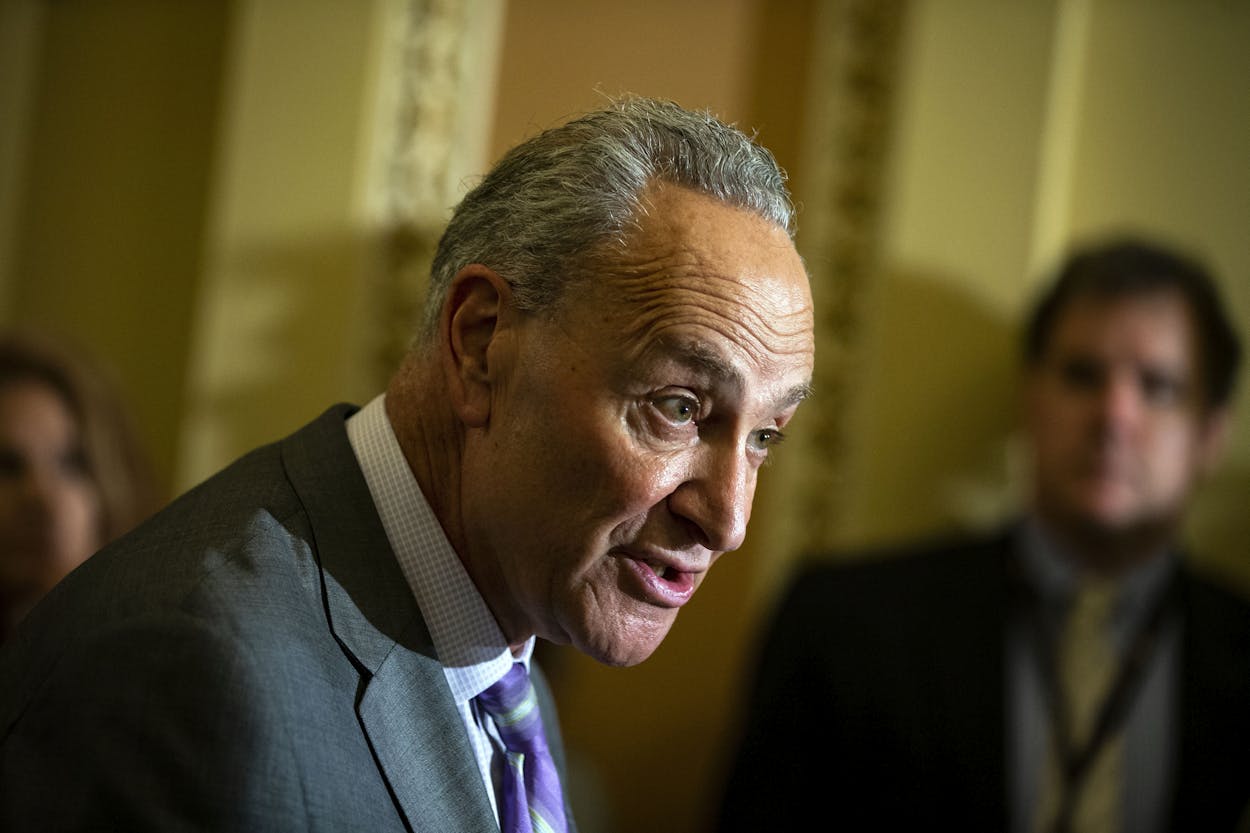Democrat Beto O’Rourke of El Paso had a very good day Wednesday. Publicly, two new polls showed him within striking distance of incumbent Republican U.S. Senator Ted Cruz. Privately, his Wednesday might have been even better. That’s because Senate Minority Leader Chuck Schumer, of New York, and about a dozen other senators in the Democratic leadership, suddenly became interested in the Texas race. That was followed by a serious look at Texas from officials of the Democratic Senatorial Campaign Committee, whose sole function is to help finance Democrats to win seats in the upper chamber of Congress. The DSCC hasn’t shown much interest in Texas for a least a generation.
The senators held a briefing on Capitol Hill Wednesday morning with at least four political polling companies about the time that the first poll, the Texas Lyceum 2018 Poll, showed Cruz with a two-point lead over O’Rourke: 41 to 39 percent. Hours later, a Quinnipiac University Poll had Cruz leading O’Rourke by a margin of 49 to 43 percent. This is the third poll that Quinnipiac has released of likely Texas voters this election season, and the six-point difference in Wednesday’s poll represents momentum by O’Rourke, who was down by 11 percentage points when its last poll was released May 30.
Numbers such as these, combined with O’Rourke raising more money than Cruz in two consecutive quarters, had at least one of the pollsters present at Wednesday’s meeting declare to Schumer and his colleagues that there was a potential path to victory for Democrats in Texas, according to at least one witness present. Schumer took great interest in that assessment and began digging deeper, the witness told Texas Monthly.
Having the active support of the DSCC as well as Senate Democratic leaders could lead to more money as well as logistical support in Texas, a state that national Senate Democrats have felt has not been in play since Senator Bob Krueger ran for the seat in 1993. He had been appointed to that seat by then-Governor Ann Richards when Lloyd Bentsen resigned from the seat to become Treasury secretary. Krueger’s political history plus the power of incumbency gave Democrats hope that he could secure the position in a special election against Kay Bailey Hutchison. But he failed, and Republicans soon began to lock up every statewide elective office after that—a lock they have to this day.
So having Washington Democrats begin to analyze their party’s chances in Texas is significant. Once the senators were finished with the briefing, members of the DSCC had more questions about O’Rourke’s chances, the witness said. One of the key advantages of active support by the DSCC is money, particularly in a state as large as Texas with so many expensive television markets. Advertising on TV may become especially critical for O’Rourke, as the Quinnipiac poll pointed out, because he continues to have low voter identification. In Wednesday’s poll, 43 percent of those surveyed said they didn’t know enough about him to have any kind of opinion.
But having the DSCC jump into the Texas fray may pose a political problem for O’Rourke and an opportunity for Cruz. O’Rourke has declared that he will not accept money from any political action committee, which is precisely what the DSCC is. An email to O’Rourke’s campaign seeking comment was not immediately answered.
Both the Quinnipiac and Texas Lyceum polls show that, of those people surveyed, Cruz enjoys much broader support among men and whites. Fifty-six percent of men support Cruz to O’Rourke’s 36 percent in the Quinnipiac poll, a number that is similar in the Lyceum poll. O’Rourke, meanwhile, has the support of more younger voters (50 to 19 percent of 18-to-29-year-olds, according to the Lyceum poll); Hispanic voters (52 to 40 percent, according to Quinnipiac); and African American voters (81 to 14 percent, according to Quinnipiac)—a base that traditionally does not vote in the numbers that white men do.
Still, the assessment that Schumer and his colleagues received pointed to Hispanics as the demographic that could hand the white O’Rourke victory over the Hispanic Cruz. But to do that, the Democratic leadership was told, O’Rourke needed to change his message to appeal to more Hispanics. The notion that he does not accept PAC money or corporate money resonates with O’Rourke’s base of white voters, the pollster told the senators. But Hispanics, by and large, don’t care about PACs or corporate donations. For them, the message must extend to include immigration, which Quinnipiac said is the number one issue in the Senate race, according to its poll respondents.
The pollster also told Schumer and the DSCC that there is not enough information about voter attitudes in Texas. A statewide poll showing a baseline of O’Rourke voters is necessary, the pollster told the Democrats. In lieu of such a poll, which can cost tens of thousands of dollars, Washington must wait for more polls to discern if they really want to invest in Texas for the first time in at least twenty years.
- More About:
- Politics & Policy
- Ted Cruz
- Beto O'Rourke






